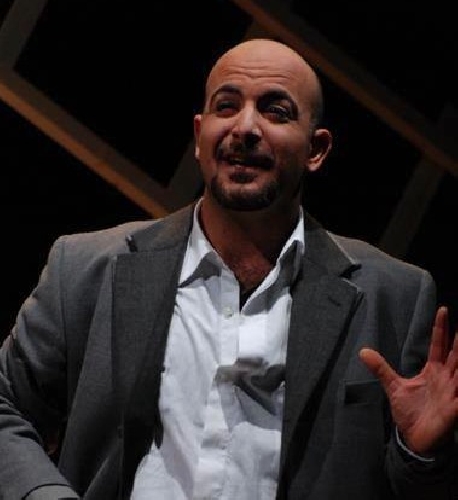

There was speculation that it was parody around the time of its first performance, but Ionesco states in an essay written to his critics that he had no intention of parody, but if he were parodying anything, it would be everything. The script is charged with non sequiturs that give the impression that the characters are not even listening to each other in their frantic efforts to make their own voices heard. Many suggest that it expresses the futility of meaningful communication in modern society. Like many plays in the theatre of the absurd genre, the underlying theme of The Bald Soprano is not immediately apparent. As they argue the lights fade when they rise again, the Martins are in the Smiths' living room, repeating the same lines with which the Smiths opened the play. Then all sense of language dissipates as the two couples quarrel, but no one is able to communicate and none of their issues are resolved.

The Martins and the Smiths recite nonsensical truisms. Mary enters and tells her own story, in which she reveals that she is the lover of the Fire Chief. While they wait for something to happen they tell telling stories, none of which make sense. He's disappointed to find no fire at the Smiths', but they promise that they'll call him if one occurs. When the Smiths return they talk about and with their guests. The Martins, alone, agree that now that they've found each other, they should just live as they had before.

She tells the audience that the two are mistaken, that they are not husband and wife, but that, never mind, things should be left just as they are. Mary is on stage with the Martins, who are asleep. They come to the conclusion that they are husband and wife. 19 Bromfield Street, that they sleep in the same bed, and that they both have a two-year-old daughter named Alice with one red eye and one white eye. They are surprised to find that they are both from the city of Manchester, that they both took the same train to London, that they both traveled third class, that they both reside at No. The Martins enter, and Mary chides them for being late then she exits.Īfter entering the room, the Martins realize that they have met each other before. Their maid, Mary enters, announcing that the Martins have arrived. Allegedly she is going to name another relative by the same name, but being that they all have the same name and work in the same industry the Smiths have a difficult time figuring out who is who. Then they shift back to reality where they realize that he has left behind two children and they are gossiping about who his wife will remarry. Suddenly they flash back to when he was alive and engaged to a woman who was also called Bobby Watson. The play then shifts back to reality and they realize that Bobby has been dead for four years. They discuss the death of someone they knew, Bobby Watson. Smith reciting the events of the night with Mr. When the lights come back on, the scene starts from the beginning with the Martins reciting the Smiths' lines from the beginning of the play for a while before the curtain closes. It's over here!" ( "C’est pas par là, c’est par ici!" ) right before a blackout occurs. It ends with the two couples shouting in unison "It's not that way.
#La cantatrice calva pdf series
Smith replies that "she always styles her hair the same way." After the Fire Chief's exit, the play devolves into a series of complete non-sequiturs with no resemblance to normal conversation. As the fire chief turns to leave, he mentions "the bald soprano" in passing, which has a very unsettling effect on the others. Martin converses with her husband as if he were a stranger she just met. The two families engage in meaningless banter, telling stories and relating nonsensical poems. They are joined later by the Smiths' maid, Mary, and the local fire chief, who is also Mary's lover. The Smiths are a traditional couple from London who have invited another couple, the Martins, over for a visit. Its actual title was the result of an error in rehearsal by actor Henri-Jacques Huet: the fire chief's monologue initially included a mention of "l'institutrice blonde" ("the blonde schoolteacher"), but Huet said "la cantatrice chauve", and Ionesco, who was present, decided to re-use the phrase. Other possible titles which were considered included Il pleut des chiens et des chats, ("It's raining cats and dogs", translated in French literally) "L'heure anglaise" and "Big Ben Follies". Impressed by the contents of the dialogues, often very sober and strange, he decided to write an absurd play named L'anglais sans peine ("English without toil").

The idea for the play came to Ionesco while he was trying to learn English with the Assimil method.


 0 kommentar(er)
0 kommentar(er)
